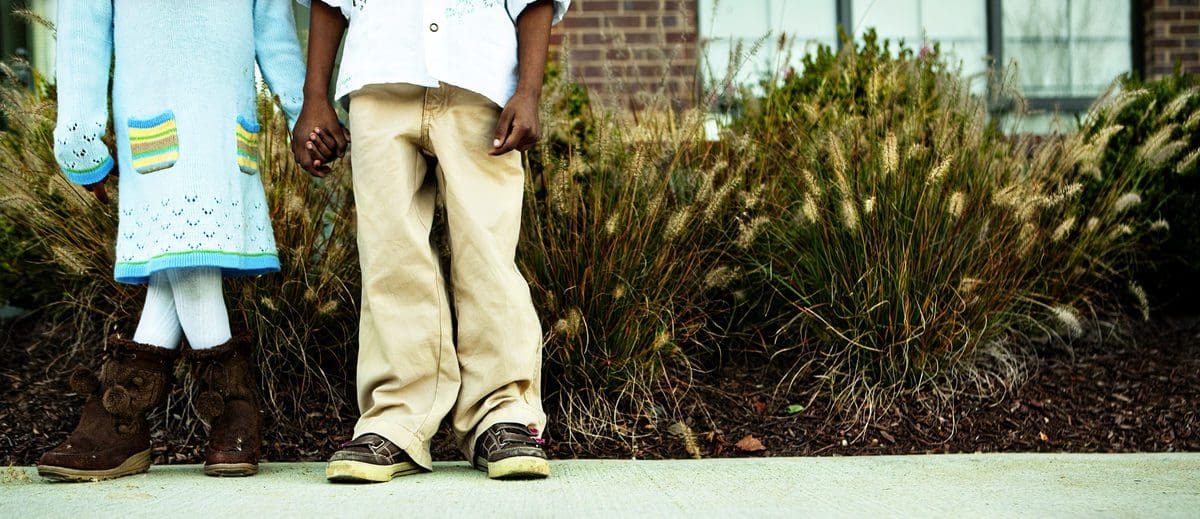Last night, my brother Travis and I flipped through old baby and toddler pictures of ourselves. We laughed at the way the shots reflected our personalities. Travis was constantly moving, destroying, and building. I, on the other hand, was always talking, reading, or imagining. My mom often reminds us what different children we were—not just because of our personalities, but because of our inborn identities as girl and boy.
For, despite what culture tells us, boys and girls are different. And this is a very good thing.
Designed Diversity
God could have made us all the same. Have you ever considered that?
But he didn’t. He made us different. And one of the most glorious distinctions he created is between boy and girl.
Yet we live in a culture that’s hijacked gender distinctions, believing these differences are nothing more than social constructs: artificial stereotypes propped up by the patriarchy and currently crippling our children. Their message is that boys and girls are not really different at all, and that to treat them as such is destructive and confining.
But God—the author of these differences—did create boys and girls to be different, so that’s not something to fear or hate. It’s something we must celebrate.
Five Ways to Celebrate the Difference Between Boys and Girls
So how do we celebrate gender differences in a hopelessly confused culture? And how do we teach our children to embrace these differences with joy? Here are five ways:
1. Show the absolute equality of boys and girls.
Our culture fails to grasp that diversity does not denote inequality. Boys and girls are fully equal in worth and dignity in the eyes of God. We see this from their very creation:
Then God said, ‘Let us make man in our image, after our likeness…So God created man in his own image, in the image of God he created him; male and female he created them. (Gen 1:26-27, emphasis added)
When two things differ, it doesn’t make one lesser than the other. Rebekah Merkle uses the example of a rolling pin and a measuring cup:
A rolling pin is different than a measuring cup, and we can acknowledge that without saying one is better than the other. And what a weird thing it would be if we did…Better at what? If you want to measure some flour, you’ll have a hard time with a rolling pin, and you’ll have similar problems trying to roll out a pie-crust with a measuring cup.
When we say boys and girls are different, we’re not shaming, embarrassing, or denigrating either gender. We’re honoring them, and our Creator God, as he intended. They’re perfectly equal in value because God made both male and female in his image. Highlighting their differences displays the beauty of God’s design.
2. Praise God for his good and intentional design.
The difference between boys and girls isn’t an artificial stereotype; it’s God’s purposeful design. In his unsearchable wisdom, he hardwired our DNA with dissimilarities.
For example, why are professional sports male and female-exclusive? It’s because men and women have fundamentally different strengths and weaknesses (Jeremiah 51:30), and pitting them against one another isn’t fair.
The difference is no mistake. God declared it to be “very good.” In fact, it’s one of the first things he tells us:
So God created man in his own image,
in the image of God he created him;
male and female he created them. (Genesis 1:27)
“And God saw everything that he had made [including men and women], and behold, it was very good” (Genesis 1:31).
When we try to minimize or blur our differences, we’re rebelling against the very way God made us—against his intentional design.
3. Affirm boys and girls in their roles.
We can celebrate our differences by affirming boys and girls when they’re playing their specific God-given role. When you see boys putting girls first (Eph. 5:25), opening doors for girls (Eph. 5:28), protecting girls (1 Pet. 3:7), affirm that. When you see girls nurturing (Titus 2:4-5), building up (Prov. 31:26-28), submitting in an appropriate context (e.g., to their father—Ephesians 6:1, Numbers 30:3-5), affirm that.
Of course, this is an affirmation of their obedience to the Lord in these roles—we’re not merely affirming “who they are.” We’re affirming their obedience to honor God’s intentions.
4. Don’t stereotype, but look at Scripture.
We can be tempted to reduce beautiful God-ordained differences to cultural stereotypes: girls like pink and boys like sports. Girls play with dolls; boys play with trucks. Girls want to be nurses and teachers; boys want to be engineers and in the armed forces. We think such preferences are what make boys and girls different. But these generalizations aren’t always true—and they’re not always biblical.
God didn’t create every girl to like pink. He did not create every boy to play sports. Those aren’t biblical mandates. Sure, these preferences often arise because boys and girls are shaped by legitimately feminine and masculine desires, but these specific preferences aren’t the differences we were created to embrace and respect.
Instead, we’re called to embrace the inherent distinctions God instilled in Adam in Eve – distinctions in body (e.g., men can’t bear children), mind (e.g., men and women use their unique intuitions to solve problems in different ways), and in marriage roles (e.g., man leads and loves while woman helps and submits).
Every man and woman, boy and girl, must go to the Scriptures and passionately seek to know and understand the role God has given them. You won’t be distracted by petty stereotypes there. Instead, you’ll find God’s vision for men and women who desire to following his perfect design for their lives.
5. Celebrate their unified goal in Christ to proclaim his excellencies.
Yet there is one way in which every boy and girl is completely the same: they are sinners. They were all born with the same problem: they are rebels against a good God.
But this good and gracious God freely extended salvation to both boys and girls through the perfect life, sacrificial death, and glorious resurrection of the Lord Jesus Christ. And this Savior infuses boys and girls with the same purpose: to live, work, and worship God in community with others (1 Peter 2:9, Titus 3:1-8). Every difference they have should be a means in reaching to their unified goal—to glorify God.
God calls both boys and girls to look to Christ as their authority, their king, their brother, and their friend. Both were made to serve Him. Both were made to love Him (Gal. 3:28).
However, the way we glorify God and live out our calling as men and women, boys and girls, is often different because of the different roles and responsibilities God’s given us. But this is “very good.” This is beautiful. This is the way things were meant to be. And that is reason to praise God.



